动词词义辨析及练习
- 格式:doc
- 大小:339.00 KB
- 文档页数:8
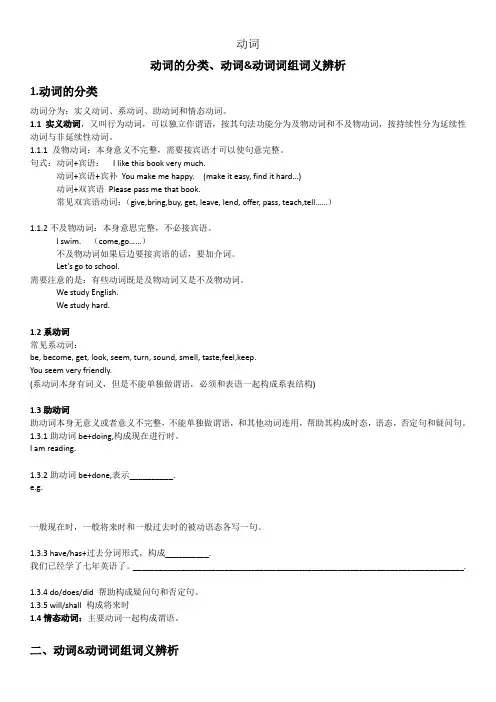
动词的分类、动词&动词词组词义辨析1.动词的分类动词分为:实义动词、系动词、助动词和情态动词。
1.1实义动词,又叫行为动词,可以独立作谓语,按其句法功能分为及物动词和不及物动词,按持续性分为延续性动词与非延续性动词。
1.1.1 及物动词:本身意义不完整,需要接宾语才可以使句意完整。
句式:动词+宾语:I like this book very much.动词+宾语+宾补You make me happy. (make it easy, find it hard…)动词+双宾语Please pass me that book.常见双宾语动词:(give,bring,buy, get, leave, lend, offer, pass, teach,tell……)1.1.2不及物动词:本身意思完整,不必接宾语。
I swim. (come,go……)不及物动词如果后边要接宾语的话,要加介词。
Let’s go to school.需要注意的是:有些动词既是及物动词又是不及物动词。
We study English.We study hard.1.2系动词常见系动词:be, become, get, look, seem, turn, sound, smell, taste,feel,keep.You seem very friendly.(系动词本身有词义,但是不能单独做谓语,必须和表语一起构成系表结构)1.3助动词助动词本身无意义或者意义不完整,不能单独做谓语,和其他动词连用,帮助其构成时态,语态,否定句和疑问句。
1.3.1助动词be+doing,构成现在进行时。
I am reading.1.3.2助动词be+done,表示__________.e.g.一般现在时,一般将来时和一般过去时的被动语态各写一句。
1.3.3 have/has+过去分词形式,构成__________.我们已经学了七年英语了。
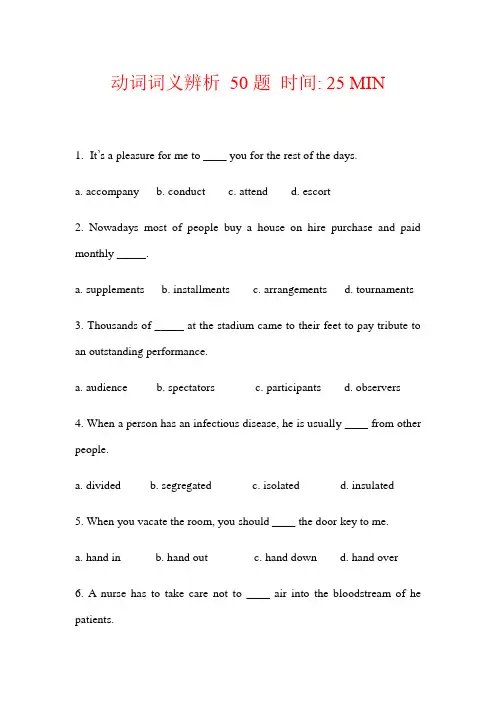
动词词义辨析50题时间: 25 MIN1.It’s a pleasure for me to ____ you for the rest of the days.a. accompanyb. conductc. attendd. escort2. Nowadays most of people buy a house on hire purchase and paid monthly _____.a. supplementsb. installmentsc. arrangementsd. tournaments3. Thousands of _____ at the stadium came to their feet to pay tribute to an outstanding performance.a. audienceb. spectatorsc. participantsd. observers4. When a person has an infectious disease, he is usually ____ from other people.a. dividedb. segregatedc. isolatedd. insulated5. When you vacate the room, you should ____ the door key to me.a. hand inb. hand outc. hand downd. hand over6. A nurse has to take care not to ____ air into the bloodstream of he patients.a. injectb. ejectc. rejectd. subject7. It is getting darker and darker. I am afraid a heavy rain is ______.a. impactingb. impeachingc. impedingd. impending8. Members of Parliament are required to _____ all their financial interests.a. discoverb. uncoverc. reveald. disclose9. Choosing foods that ____ your body and brain can help prevent or delay diseases.a. nurseb. tendc. fosterd. nourish10. A teacher who is skillful in delivering his lecture can undoubtedly _____ the mind of students.a. encourageb. inspirec. motivated. promote11. He ____ considerable influence on the thinking of the scientific community on these issues.a. exertedb. exaltedc. excelledd. exiled12. These discoveries may throw light on the origins of the universe. The underlined part means _____.a. make afterb. make believec. make liked. make clear13. He ____ round through these figures and told the manager what he thought of them.a. gazedb. glancedc. glaredd. peeped14. You all know the reasons which have impelled me to ____ the throne.a. renderb. renovatec. renounced. renew15. Desire, hatred and envy ____ his mind and lead it into a pursuit of power and possessions.a. distortb. deviatec. depictd. divert16. He ___ her on her new dress without even looking at it.a. recommendedb. clappedc. commendedd. complimented17. My dad likes to ____ my mom about her cooking.a. pick onb. pick overc. pick outd. pick up on18. You shouldn’t ____ your father’s advice. Anyway he is much more experienced than you in this matter.a. deduceb. deliberatec. defyd. denounce19. Travis hopes to be ____ from hospital next month.a. dischargedb. dismissedc. expelledd. resigned20. After three hours of questioning the suspect broke down and _____.a. acknowledgedb. recognizedc. concededd. confessed21. Businesses are holding off on hiring new employees. The underlined part means _____.a. stopb. continuec. delayd. succeed in22. The computer can be programmed to ______ a whole variety of tasks.a. solveb. tacklec. realized. assign23. It took Jackson a long time to adjust to civilian life after he ____ from the army.a. retiredb. retreatedc. withdrewd. resigned24. “Everything is going to be fine,”my mother said, ____ me on the head.a. knockingb. tappingc. rappingd. patting25. If we can ____ this recession, we will be in good shape.a. break throughb. go throughc. put throughd. pull through26. The company decision had much bearing on the way that thecompany was managed. The underlined part means _____.a. manifestedb. revealedc. influencedd. exposed27. These tight jeans will ____ to fit you perfectly as you wear them more.a. prolongb. extendc. stretchd. lengthen28. You will be ____ of your driver’s license if you continue to break the traffic rules.a. robbedb. stolenc. plunderedd. deprived29. Both approaches agree on what is depicted in the poem, but not on how it should be _____.a. explainedb. illustratedc. interpretedd. accounted30. Tom had been invited to the evening party but ____ on the grounds that he was too busy.a. declinedb. refusedc. rejectedd. denied31. Riot police moved through the streets firing into the air to ____ the crowd.a. broadcastb. dispersec. spreadd. diffuse32. Although it seemed to take all her strength, the patient ____ up a smile to her mom.a. sentb. conjuredc. summonedd. squeezed33. the old couple took a very long time to ____ the loss of their son.a. get overb. get awayc. get offd. get across34. There are reports that pupils in some areas were ____ to participate in welcome ceremonies.a. compelledb. obligedc. restrictedd. commanded35. The service operates 48 libraries throughout the country, while 18 ____ libraries specially serve the countryside.a. driftingb. mobilec. shiftingd. rotating36. I wish I could go to the movies, but I’ve got to hit the books. The underlined part means _____.a. have classb. studyc. borrow booksd. prepare37. I shouted to the driver of the tractor to _____ and let me through.a. pull outb. pull upc. pull throughd. pull over38. Hearing we will ____ candies, the children suddenly gather aroundus.a. assignb. distributec. scatterd. allocate39. The government will require all hospitals and clinics in some small states to ____ to minimum clinical standards.a. caterb. adherec. ascribed. subscribe40. The lack of a good education might ____ you from some jobs.a. disfavorb. dispelc. disqualifyd. dismiss41. Scientists have been calculating the likelihood of a small planet to ____ with the Earth in the year 2182.a. coincideb. stumblec. tumbled. collide42. He got to miss a month of work to ____, and apparently, everyone was jealous of him.a. remedyb. healc. recoverd. restore43. The bank will have to _____ that you are the owner of the property.a. certifyb. confirmc. testifyd. verify44. The plot to ____ this great political leader had started long before.a. murderb. slaughterc. massacred. assassinate45. The government is thinking of ____ heavy taxes on cigarettes to raise extra revenue.a. impairingb. imposingc. invadingd. integrating46. I think our boss took a powder right after the meeting. The underlined part means ______.a. left quicklyb. got angryc. made a decisiond. took a bow47. When the child saw something fierce and violent on TV, he would ____ under the table and cry.a. catchb. crawlc. creepd. mount48. Please ____ from smoking until the airplane is airborne.a. resistb. preventc. refraind. restrain49. He studied the map carefully, trying to ____ the nearest route to the beach.a. memorizeb. recallc. rememberd. remind50. the TV station has hired more than 65 people to get its Washington,D.C. operation _____.a. off the groundb. on the groundc. below groundd. above ground。
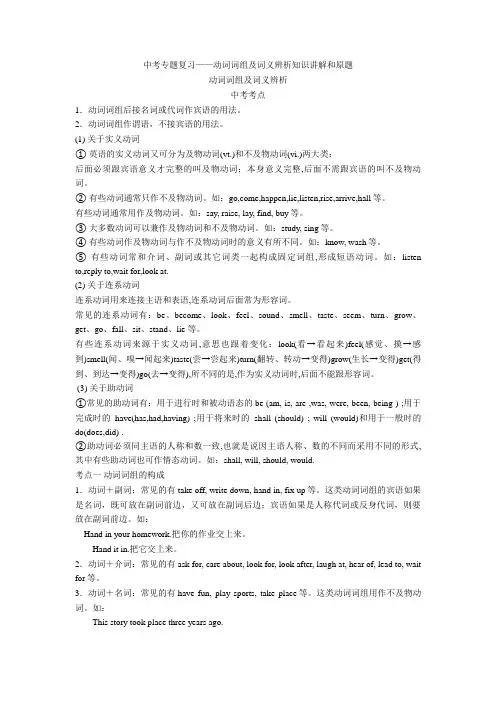
中考专题复习——动词词组及词义辨析知识讲解和原题动词词组及词义辨析中考考点1.动词词组后接名词或代词作宾语的用法。
2.动词词组作谓语,不接宾语的用法。
(1) 关于实义动词①英语的实义动词又可分为及物动词(vt.)和不及物动词(vi.)两大类:后面必须跟宾语意义才完整的叫及物动词;本身意义完整,后面不需跟宾语的叫不及物动词。
②有些动词通常只作不及物动词。
如:go,come,happen,lie,listen,rise,arrive,hall等。
有些动词通常用作及物动词。
如:say, raise, lay, find, buy等。
③大多数动词可以兼作及物动词和不及物动词。
如:study, sing等。
④有些动词作及物动词与作不及物动词时的意义有所不同。
如:know, wash等。
⑤有些动词常和介词、副词或其它词类一起构成固定词组,形成短语动词。
如:listen to,reply to,wait for,look at.(2) 关于连系动词连系动词用来连接主语和表语,连系动词后面常为形容词。
常见的连系动词有:be、become、look、feel、sound、smell、taste、seem、turn、grow、get、go、fall、sit、stand、lie 等。
有些连系动词来源于实义动词,意思也跟着变化:look(看→看起来)feel(感觉、摸→感到)smell(闻、嗅→闻起来)taste(尝→尝起来)turn(翻转、转动→变得)grow(生长→变得)get(得到、到达→变得)go(去→变得),所不同的是,作为实义动词时,后面不能跟形容词。
(3) 关于助动词①常见的助动词有:用于进行时和被动语态的be (am, is, are ,was, were, been, being ) ;用于完成时的have(has,had,having) ;用于将来时的shall (should) ; will (would)和用于一般时的do(does,did) .②助动词必须同主语的人称和数一致,也就是说因主语人称、数的不同而采用不同的形式,其中有些助动词也可作情态动词。
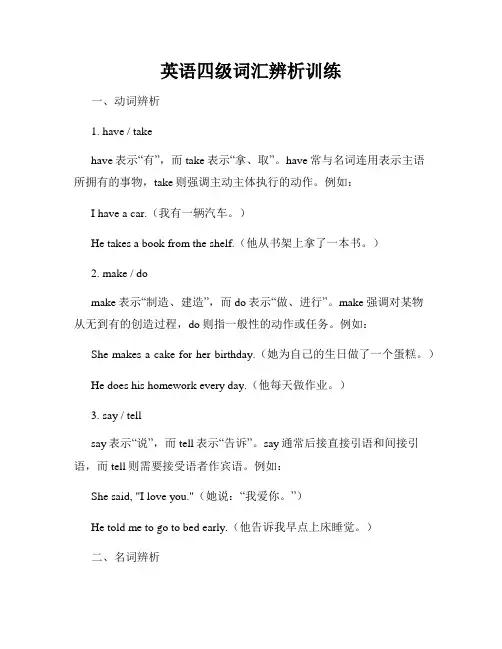
英语四级词汇辨析训练一、动词辨析1. have / takehave表示“有”,而take表示“拿、取”。
have常与名词连用表示主语所拥有的事物,take则强调主动主体执行的动作。
例如:I have a car.(我有一辆汽车。
)He takes a book from the shelf.(他从书架上拿了一本书。
)2. make / domake表示“制造、建造”,而do表示“做、进行”。
make强调对某物从无到有的创造过程,do则指一般性的动作或任务。
例如:She makes a cake for her birthday.(她为自己的生日做了一个蛋糕。
)He does his homework every day.(他每天做作业。
)3. say / tellsay表示“说”,而tell表示“告诉”。
say通常后接直接引语和间接引语,而tell则需要接受语者作宾语。
例如:She said, "I love you."(她说:“我爱你。
”)He told me to go to bed early.(他告诉我早点上床睡觉。
)二、名词辨析1. job / workjob指具体的、具体的职业、职责或任务,work表示工作的行为或活动。
例如:He has a good job in a bank.(他在一家银行有一份好工作。
)She works eight hours a day.(她一天工作八小时。
)2. money / cashmoney指的是一般意义上的钱,而cash特指手中的现金。
例如:I don't have enough money to buy a new car.(我没有足够的钱买一辆新车。
)He paid for the meal in cash.(他用现金支付了这顿饭。
)3. friend / colleaguefriend指的是朋友,而colleague表示同事或工作伙伴。
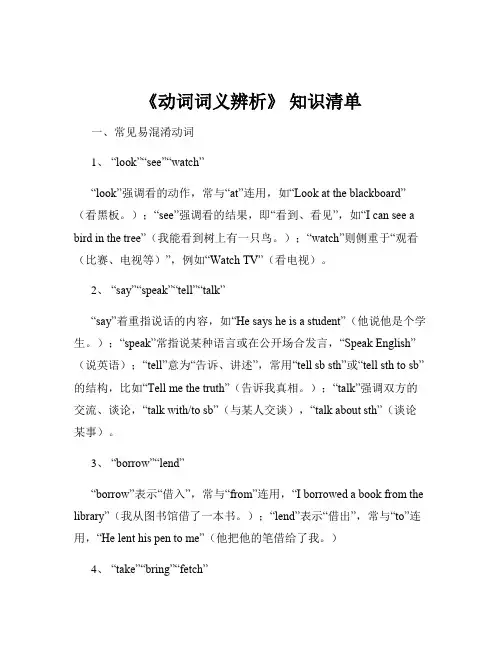
《动词词义辨析》知识清单一、常见易混淆动词1、“look”“see”“watch”“look”强调看的动作,常与“at”连用,如“Look at the blackboard”(看黑板。
);“see”强调看的结果,即“看到、看见”,如“I can see a bird in the tree”(我能看到树上有一只鸟。
);“watch”则侧重于“观看(比赛、电视等)”,例如“Watch TV”(看电视)。
2、“say”“speak”“tell”“talk”“say”着重指说话的内容,如“He says he is a student”(他说他是个学生。
);“speak”常指说某种语言或在公开场合发言,“Speak English”(说英语);“tell”意为“告诉、讲述”,常用“tell sb sth”或“tell sth to sb”的结构,比如“Tell me the truth”(告诉我真相。
);“talk”强调双方的交流、谈论,“talk with/to sb”(与某人交谈),“talk about sth”(谈论某事)。
3、“borrow”“lend”“borrow”表示“借入”,常与“from”连用,“I borrowed a book from the library”(我从图书馆借了一本书。
);“lend”表示“借出”,常与“to”连用,“He lent his pen to me”(他把他的笔借给了我。
)4、“take”“bring”“fetch”“take”意为“带走、拿走”,指从说话者所在的地方带到别处去,“Take this book to your classroom”(把这本书带到你的教室去。
);“bring”表示“带来、拿来”,指从别处带到说话者所在的地方,“Bring your homework here tomorrow”(明天把你的作业带来。
);“fetch”则表示“去取来、去拿来”,强调往返的动作,“Fetch some water for me, please”(请给我去取些水来。
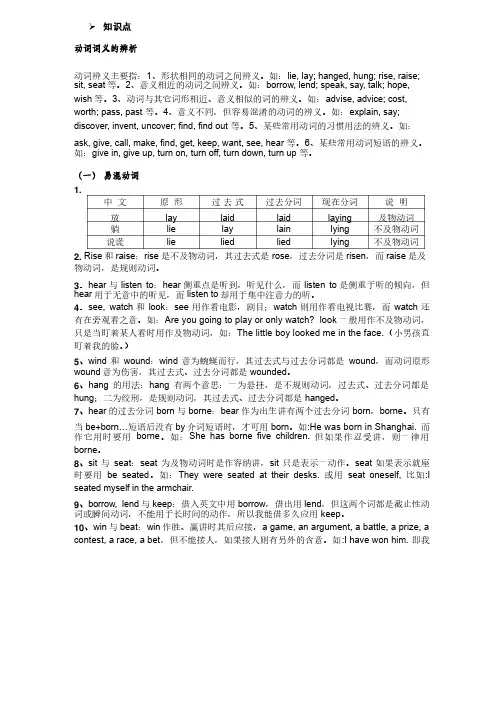
Ø 知识点动词词义的辨析动词辨义主要指:1、形状相同的动词之间辨义。
如:lie, lay; hanged, hung; rise, raise; sit, seat 等。
2、意义相近的动词之间辨义。
如:borrow, lend; speak, say, talk; hope, wish 等。
3、动词与其它词形相近、意义相似的词的辨义。
如:advise, advice; cost, worth; pass, past 等。
4、意义不同,但容易混淆的动词的辨义。
如:explain, say; discover, invent, uncover; find, find out 等。
5、某些常用动词的习惯用法的辨义。
如:ask, give, call, make, find, get, keep, want, see, hear 等。
6、某些常用动词短语的辨义。
如:give in, give up, turn on, turn off, turn down, turn up 等。
等。
(一) 易混动词1.中 文 原 形 过 去 式 过去分词过去分词 现在分词现在分词 说 明放 lay laid laid laying 及物动词及物动词躺 lie lay lain lying 不及物动词不及物动词说谎说谎 lie lied lied lying 不及物动词不及物动词2. Rise 和raise :rise 是不及物动词,其过去式是rose ,过去分词是risen ,而raise 是及物动词,是规则动词。
物动词,是规则动词。
3.hear 与listen to :hear 侧重点是听到,听见什么,而listen to 是侧重于听的倾向,但hear 用于无意中的听见,而listen to 却用于集中注意力的听。
却用于集中注意力的听。
4.see, watch 和look :see 用作看电影,剧目;watch 则用作看电视比赛,而watch 还有在旁观看之意。
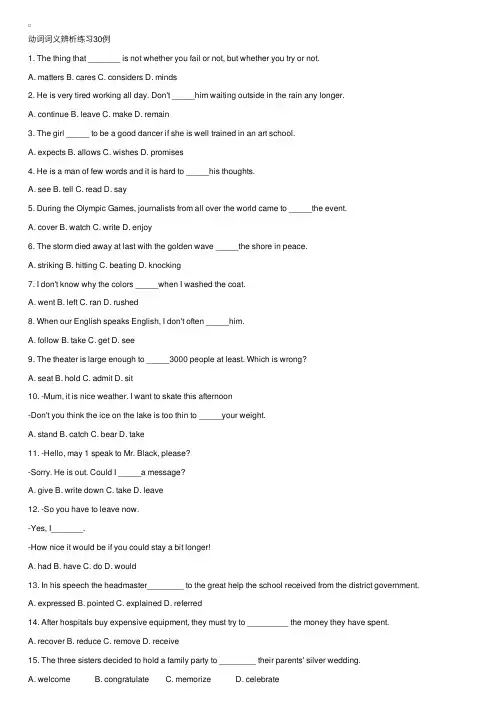
动词词义辨析练习30例1. The thing that _______ is not whether you fail or not, but whether you try or not.A. mattersB. caresC. considersD. minds2. He is very tired working all day. Don't _____him waiting outside in the rain any longer.A. continueB. leaveC. makeD. remain3. The girl _____ to be a good dancer if she is well trained in an art school.A. expectsB. allowsC. wishesD. promises4. He is a man of few words and it is hard to _____his thoughts.A. seeB. tellC. readD. say5. During the Olympic Games, journalists from all over the world came to _____the event.A. coverB. watchC. writeD. enjoy6. The storm died away at last with the golden wave _____the shore in peace.A. strikingB. hittingC. beatingD. knocking7. I don't know why the colors _____when I washed the coat.A. wentB. leftC. ranD. rushed8. When our English speaks English, I don't often _____him.A. followB. takeC. getD. see9. The theater is large enough to _____3000 people at least. Which is wrong?A. seatB. holdC. admitD. sit10. -Mum, it is nice weather. I want to skate this afternoon-Don't you think the ice on the lake is too thin to _____your weight.A. standB. catchC. bearD. take11. -Hello, may 1 speak to Mr. Black, please?-Sorry. He is out. Could I _____a message?A. giveB. write downC. takeD. leave12. -So you have to leave now.-Yes, I_______.-How nice it would be if you could stay a bit longer!A. hadB. haveC. doD. would13. In his speech the headmaster________ to the great help the school received from the district government.A. expressedB. pointedC. explainedD. referred14. After hospitals buy expensive equipment, they must try to _________ the money they have spent.A. recoverB. reduceC. removeD. receive15. The three sisters decided to hold a family party to ________ their parents' silver wedding.A. welcomeB. congratulateC. memorizeD. celebrate16. -________ you be happy!-The same to you!A. WishB. HopeC. MayD. Should17. I had hoped to get to the meeting, but I found at the last minute that I couldn't _______ it.A. tryB. meetC. getD. make18. We trust you; only you can _______ him to give up smoking.A. suggestB. attractC. adviseD. persuade19. Though _______ in a big city Jim always prefers to paint the primitive(原始的)scenes of country life.A. raisedB. grownC. caredD. fed20 In that country, guests usually feel that they are not highly ________ if the invitation to a dinner party is given only three or four days before the party date.A. regardedB. thoughtC. admiredD. concerned21. Just after putting the baby onto bed, Mrs. White suddenly caught sight of the pet cat and didn't know how long it _____ on the table _____ for the family dinner.A. had been laying, lyingB. had been lying, laidC. had been laid, laidD. had lain, laying22. -Don't have yourself____ there. Come and help me.-Where would you like to have the table _____?A. sitting; laidB. sitting; lainC. seat; lyingD. sit; lain23. In case anyone looks for me, please tell them to _____word on my office-table.A. writeB. passC. leaveD. have24.--Where do you _____I go this evening?-- I think you'd better stay at home, instead of going anywhere.A. supposeB. suggestC. meanD. want25. Mr. Baker suggested a good way _____prices from_____.A. to stop, risingB. of stopping, being risenC. to stop, raisingD. stopped, being raised26. Professor Wang works in our city as a researcher. It will be two years since he _____here.A. leftB. stayedC. cameD. lived27. We can't ______the car. There ______something wrong with the engine.A. drive; must beB. start; must be.C. start; hasD. begin; must have28. Our dog _____we were in danger long before we did.A. sensedB. thoughtC. consideredD. expected29. In developing countries people are ____ into overcrowded cities in great numbers to hunt for fortunes.A. pouringB. fillingC. hurryingD. pushing30. He was wandering in the park, ______ his time watching the children playing.A. savingB. costingC. sparingD. killing答案与简析:1. A. matter"重要、要紧(=be important)"。
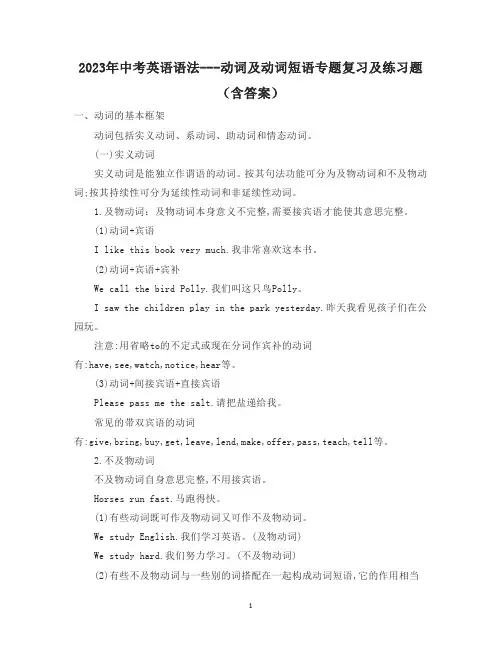
2023年中考英语语法---动词及动词短语专题复习及练习题(含答案)一、动词的基本框架动词包括实义动词、系动词、助动词和情态动词。
(一)实义动词实义动词是能独立作谓语的动词。
按其句法功能可分为及物动词和不及物动词;按其持续性可分为延续性动词和非延续性动词。
1.及物动词:及物动词本身意义不完整,需要接宾语才能使其意思完整。
(1)动词+宾语I like this book very much.我非常喜欢这本书。
(2)动词+宾语+宾补We call the bird Polly.我们叫这只鸟Polly。
I saw the children play in the park yesterday.昨天我看见孩子们在公园玩。
注意:用省略to的不定式或现在分词作宾补的动词有:have,see,watch,notice,hear等。
(3)动词+间接宾语+直接宾语Please pass me the salt.请把盐递给我。
常见的带双宾语的动词有:give,bring,buy,get,leave,lend,make,offer,pass,teach,tell等。
2.不及物动词不及物动词自身意思完整,不用接宾语。
Horses run fast.马跑得快。
(1)有些动词既可作及物动词又可作不及物动词。
We study English.我们学习英语。
(及物动词)We study hard.我们努力学习。
(不及物动词)(2)有些不及物动词与一些别的词搭配在一起构成动词短语,它的作用相当于一个及物动词。
①动词+介词Listen to the teacher carefully.仔细听老师讲。
此类动词短语后面的宾语无论是名词还是代词,都只能放在介词后面,不能放在动词和介词之间。
②动词+副词+介词Let’s go on with our work!让我们继续我们的工作吧!He gets along well with his classmates.他与他的同学们相处得很好。
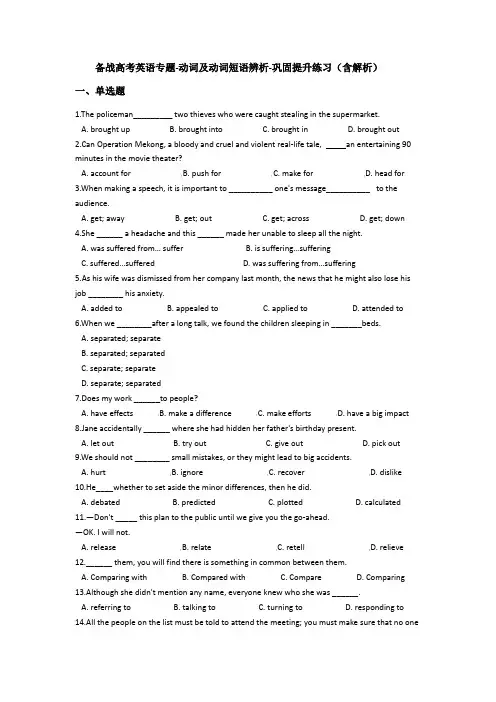
备战高考英语专题-动词及动词短语辨析-巩固提升练习(含解析)一、单选题1.The policeman_________ two thieves who were caught stealing in the supermarket.A.brought upB.brought intoC.brought inD.brought out2.Can Operation Mekong, a bloody and cruel and violent real-life tale, an entertaining 90 minutes in the movie theater?A.account forB.push forC.make forD.head for3.When making a speech, it is important to __________ one's message__________to the audience.A.get; awayB.get; outC.get; acrossD.get; down4.She ______ a headache and this ______ made her unable to sleep all the night.A.was suffered from… sufferB.is suffering…sufferingC.suffered…sufferedD.was suffering from…suffering5.As his wife was dismissed from her company last month, the news that he might also lose his job ________ his anxiety.A.added toB.appealed toC.applied toD.attended to6.When we ________after a long talk, we found the children sleeping in _______beds.A.separated; separateB.separated; separatedC.separate; separateD.separate; separated7.Does my work ______to people?A.have effectsB.make a differenceC.make effortsD.have a big impact8.Jane accidentally ______ where she had hidden her father's birthday present.A.let outB.try outC.give outD.pick out9.We should not ________ small mistakes, or they might lead to big accidents.A.hurtB.ignoreC.recoverD.dislike10.He____whether to set aside the minor differences, then he did.A.debatedB.predictedC.plottedD.calculated11.—Don't _____ this plan to the public until we give you the go-ahead.—OK. I will not.A.releaseB.relateC.retellD.relieve12.______ them, you will find there is something in common between them.paring withpared withpareparing13.Although she didn't mention any name, everyone knew who she was ______.A.referring toB.talking toC.turning toD.responding to14.All the people on the list must be told to attend the meeting; you must make sure that no oneis _______.A.left outB.set asideC.cut offD.kept away15.The car was not seriously ______ in the accident and it won't cost much to get it repaired.A.destroyedB.ruinedC.damagedD.suffered16.If a person has not had enough sleep, his actions will ______ him ______ during the day.A.give…inB.give…awayC.give…upD.give…back17.You'll feel much better if you_______ the pills.A.takeB.drinkC.eatD.get18.With their hard work, they were soon able to ______ their own company.A.set downB.set outC.set upD.set off19.Did it ever ________to you to contact the police when you saw the suspect?A.occurB.referC.happenD.apply20.—Julia failed to ____ her mid-term exam.—What a pity! No wonder she is in low spirits.A.get overB.get throughC.get acrossD.get round21.— You shouldn't have gone there alone last night.— But I ______, because Xiao Wang went there, too.A.didn'tB.had toC.didD.should22.Studies have long shown that our heart rates and anxiety levels rise and fall ______ on the speeds of the music we hear.A.dependsB.dependedC.dependingD.to depend23.Don't worry. He's now fully _______ from the operation.A.recoveringB.recoveredC.uncoveringD.uncovered24.Leeanne Carlson wanted $ 20 million for his large house with two gardens, but he _______ $ 10 million.A.settled forB.settled downC.settled onD.settled in25.As she more and more experience on the stage, the comedian's confidence built up gradually.A.abusedB.accompaniedC.accumulatedD.accelerated26.I think you should stop for a moment and on your successes and failures.A.lookB.callC.reflectD.take27.Good writers always an outline before writing an article.A.keep outB.try outC.hand outD.work out28.People who can't ________ between colors are said to be colorblind.A.separateB.differC.distinguishD.divide29.The popular star stood there,_______by many students.A.surroundedB.surroundingC.to surroundD.surround30.While _____ dogs, people should take care not to ____. Otherwise, they may be dangerous to others.A.walking; let them looseB.walk; let them looseC.walking; let them loseD.training; get them run31.Looking back on the three-year life in the mountain village, Thomas ________ it as a milestone in his personal development.A.declaresB.assumesC.valuesD.confirms32.The old ____well looked after by the government in China.A.isB.areC.has beenD.was33.___ in London, the penniless American wandered on the pavement, ___ to find a job to makea living.A.Lost; hopedB.Losing; hopedC.Lost; hopingD.Losing; hoping34.— I'm still working on my project.—Oh, you'll miss the deadline. Time is .A.running outB.giving outing upD.losing out35.Rod loves clocks. However,he never manages to put them together again.A.taking apartB.giving awayC.making upD.turning off36.Parents _________much importance to education. They will do their best to give their children that priceless gift.A.payB.applyC.attachD.link37.You should take more exercise to _______ your strength after your recovery.A.set upB.turn upC.show upD.build up38.The young man was glad that his experience as a cook in the army finally _______.A.paid offB.paid forC.paid upD.paid back39.The passengers were angry for the train being ______ without a notice in advance.A.called inB.called upC.called forD.called off40.He was the only one of the boys who late for class.A.areB.isC.wereD.was41.I've been trying to phone Charles all evening, but there must be something wrong with the network; I can't seem to_____.A.get throughB.get offC.get inD.get along42.—Do you have enough to ____________ all your daily expenses?—Oh, yes, enough and to spare.A.coverB.spendC.fillD.offer二、语法填空43.Studies have shown long periods of stress can lead ________ serious health problems.44.I will be ________(have) a meeting at three o'clock this afternoon.45.Anyhow, my goal is to provide humans ________ a life ________ high quality.46.She succeeded ________ passing the final examination.47.Only when his wife left him ________he know that he still loved her.答案一、单选题1.【答案】C【解析】【分析】考查动词词组辨析。
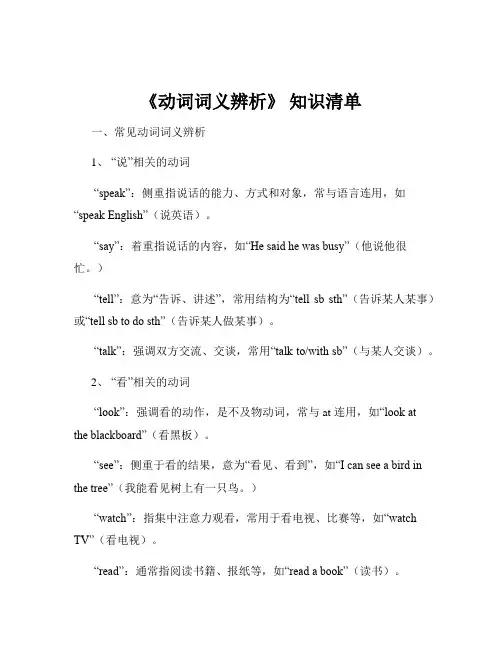
《动词词义辨析》知识清单一、常见动词词义辨析1、“说”相关的动词“speak”:侧重指说话的能力、方式和对象,常与语言连用,如“speak English”(说英语)。
“say”:着重指说话的内容,如“He said he was busy”(他说他很忙。
)“tell”:意为“告诉、讲述”,常用结构为“tell sb sth”(告诉某人某事)或“tell sb to do sth”(告诉某人做某事)。
“talk”:强调双方交流、交谈,常用“talk to/with sb”(与某人交谈)。
2、“看”相关的动词“look”:强调看的动作,是不及物动词,常与 at 连用,如“look at the blackboard”(看黑板)。
“see”:侧重于看的结果,意为“看见、看到”,如“I can see a bird in the tree”(我能看见树上有一只鸟。
)“watch”:指集中注意力观看,常用于看电视、比赛等,如“watch TV”(看电视)。
“read”:通常指阅读书籍、报纸等,如“read a book”(读书)。
3、“拿、带”相关的动词“take”:表示拿走、带走,强调从说话者所在的地方带到别处,如“Take this book to the library”(把这本书带到图书馆去。
)“bring”:意为带来、拿来,强调从别处带到说话者所在的地方,如“Bring your homework to school tomorrow”(明天把你的作业带到学校来。
)“fetch”:去取、去拿来,强调往返的动作,如“Fetch some water for me”(去给我取些水来。
)4、“花费”相关的动词“spend”:主语是人,常用结构为“spendon sth”(在某物上花费)或“spend(in) doing sth”(花费做某事),如“He spent two hours on his homework”(他花了两个小时做作业。
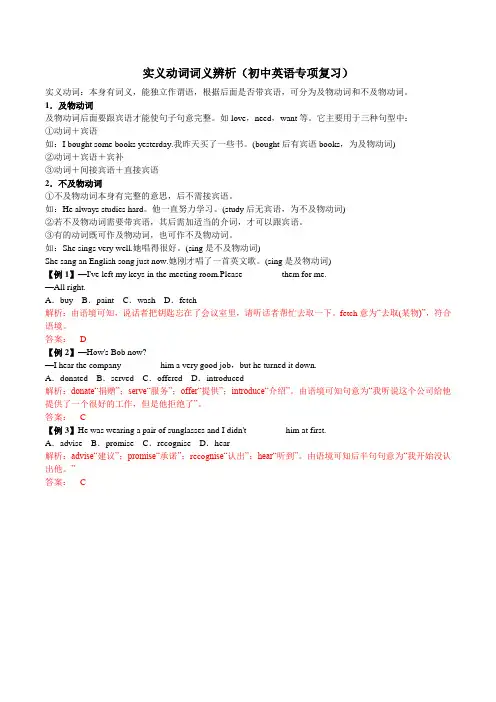
实义动词词义辨析(初中英语专项复习)实义动词:本身有词义,能独立作谓语,根据后面是否带宾语,可分为及物动词和不及物动词。
1.及物动词及物动词后面要跟宾语才能使句子句意完整。
如love,need,want等。
它主要用于三种句型中:①动词+宾语如:I bought some books yesterday.我昨天买了一些书。
(bought后有宾语books,为及物动词)②动词+宾语+宾补③动词+间接宾语+直接宾语2.不及物动词①不及物动词本身有完整的意思,后不需接宾语。
如:He always studies hard。
他一直努力学习。
(study后无宾语,为不及物动词)②若不及物动词需要带宾语,其后需加适当的介词,才可以跟宾语。
③有的动词既可作及物动词,也可作不及物动词。
如:She sings very well.她唱得很好。
(sing是不及物动词)She sang an English song just now.她刚才唱了一首英文歌。
(sing是及物动词)【例1】—I've left my keys in the meeting room.Please ________ them for me.—All right.A.buy B.paint C.wash D.fetch解析:由语境可知,说话者把钥匙忘在了会议室里,请听话者帮忙去取一下。
fetch意为“去取(某物)”,符合语境。
答案:__D__【例2】—How's Bob now?—I hear the company ________ him a very good job,but he turned it down.A.donated B.served C.offered D.introduced解析:donate“捐赠”;serve“服务”;offer“提供”;introduce“介绍”。
由语境可知句意为“我听说这个公司给他提供了一个很好的工作,但是他拒绝了”。
英语:英语动词短语词义辨训练及解析含答案一、选择题1.Daniel is the most modest boy in our class, because he never ________ in public.A.gets off B.takes off C.shows off D.turns off2.The book is written by T. C.Smith.What does the “T. C.”?A.pay attention to B.regard as C.stand for D.set off3.Life is full of ups and downs. When your friends are unhappy, tell them something funny and encourage them to ________.A.put up B.cheer up C.stay up D.give up4.—I’m sorry to ________ on you, but there is something I don’t unders tand.—It doesn’t matter.A.cut down B.cut out C.cut in D.cut off5.It’s rude and impolite to ________ before others while everyone is queuing to buy tickets. A.take in B.cut in C.put in D.break in6.Far water does not ________ near fire.A.put up B.put away C.put out D.put in7.— Hi, Simon! You look so excited. What happened?—We won the football match, and the result ________ to be better than expected.A.turned out B.found out C.worked out D.came out8.The job ________ to be harder than they thought.A.found out B.turned out C.ran out D.worked out9.A forest fire ________ in September in Australia last year and many rare animals lost their lives in it.A.turned out B.broke out C.put out D.worked out 10.Andrew once tried to ________ a brighter light in his bedroom, but he failed in the end. A.put on B.put in C.put out D.put up 11.—Amy, how many of your classmates have brothers or sisters?—Believe it or not, it ________ to be one quarter.A.takes out B.breaks out C.turns out D.finds out 12.—Sorry to ________ your valuable time.—It’s OK.A.take off B.take up C.take out D.take in13.The director of Up series passed away, and the workmates are thinking about whether the documentary can ________ without him.A.carry on B.carry out C.take on D.take out 14.Scientists need to ________ several surveys before making a conclusion.A.give up B.carry out C.hear of D.look for 15.—What time does the first train to Beijing leave?—Wait a minute. I am just ________ the train times.A.taking up B.picking up C.making up D.looking up 16.—We have waited for Tom for half an hour. Why hasn’t he ________ yet?—He may have got lost. Let me call him.A.cheered up B.taken up C.stayed up D.shown up 17.Judy waited a long time for her mom, but she didn't ________.A.show up B.get up C.wake up D.stay up 18.—We must act now as time is _________.—Yes. Let's start.A.coming out B.going out C.putting out D.running out 19.—Aunt Lexie, could you please teach me how to _________ "red envelope" on WeChat?—Certainly. It goes like this.A.give away B.give up C.give back D.give out 20.—What happened, Martin?—Last night, someone ________ my house and stole many valuable things.A.broke into B.broke down C.turned into D.turned down 21.My sister seldom spends time on TV or computer at weekends because reading ________ most of her free time.A.takes on B.takes up C.takes away D.takes off 22.—All right, I’ll take it. But I tell you, it is the last time I will _________ this kind of work —Come on, Buddy! Don’t be so serious.A.take off B.take out C.take on D.take up 23.Would you please ____________ the light? I can't sleep well with it on.A.turn on B.turn off C.turn to D.turn around 24.—Excuse me, does Mr. Smith’s son live here?— He ________ be here. But now he ________ in the city.A.used to; is used to live B.was used to; is used to livingC.used to; is used to living D.is used to; used to live25.We should ________ the job bravely instead of complaining too much. It’s our duty! A.take away B.take up C.take on D.take off 26.Every time a serious disease ________, city planners will come up with new ideas to fight it. A.breaks down B.breaks out C.breaks into D.breaks up27.All of us had a good time during this year’s May Day holiday because we ________ five days________ .A.had...off B.took...off C.put...off D.turned...off 28.My father always tells me to ________ any possible challenge myself instead of giving up easily!A.take away B.take off C.take up D.take on29.The baby is sleeping. Would you please ________?A.turned the radio on B.turn the radio downC.turned the radio off D.turn the radio up30.I know how busy you must be and naturally I wouldn’t want to ________ too much of your time.A.put up B.take up C.give up D.make up 31.Bob is busy taking the desks and chairs away because they ___________ too much room in the hall.A.pick up B.take up C.put up D.cheer up 32.There is no doubt that the United Nations will continue to ________ building a community with a shared future for mankind.A.look for B.care for C.hope for D.push for33.The person who ________ a new idea of how to work out the puzzle will be given a(n)________.A.keeps up with; praise B.comes up with; prize C.ends up with; price D.puts up with; award34.—Your spoken English is very good. How do you improve it?—Thanks. Mrs. Wang always asks us to ________ dialogues in our English classes and practice speaking English as often as possible.A.take up B.make up C.put up D.mop up 35.—The Civil Code (民法典) ________ to be a big success and it is a milestone in our country legal science.—I ca n’t agree more.A.turns out B.puts out C.takes out D.breaks out 36.—What do the students think of this book?—It’s really a good book. They all________it.A.look over B.think about C.think highly of D.win the heart of 37.—Excuse me, sir, but smoking is not allowed in hospital.—Sorry, I didn’t see the sign. I’ll _______ my cigarette.A.put in B.put up C.put out D.put on38.The workers ________ a sign to warn people of the danger here.A.put out B.put in C.put up D.put on39.If parents do everything for thei r children, they won’t learn to ________ themselves. A.depend on B.get on C.put on D.come on 40.Most boys ________ toy guns while girls ________ have dolls.A.would rather; prefer B.prefer; would ratherC.would rather; would rather D.prefer; prefer【参考答案】一、选择题1.C解析:C【详解】句意:丹尼尔是我们班最谦虚的男孩,因为他从不在公共场合炫耀。
2022届大一轮复习小专题训练语法系列6.动词词义辨析高考动词主要考查1.词义辨析 2.习惯搭配 3.熟词新义 4.不及物动词1. Many companies are eager to sign a contract with Amanda, who has the potential to _____ a super star.A. remainB. growC. makeD. turn2. The workers ______ the glasses and marked on each box “This Side UP”.A. carriedB. deliveredC. pressedD. packed3. The new movie ______ to be one of the biggest moneymakers of all time.A. promisesB. agreesC. pretendsD. declines4. Your house is always so neat—how do you ______ it with three children?A. manageB. serveC. adaptD. construct5. Just as Professor Scott often _______ it, success is ninety nine percent mental attitude.A. getsB. makesC. putsD. means6. --Do you have enough to _____ all your daily expenses?--Oh yes, enough and to spare.A. coverB. spendC. fillD. offer7. One of the best ways for people to keep fit is to ________ healthy eating habits.A. growB. developC. increaseD. raise8. Words _____ me when I wanted to express my thanks to him. I just held his hands firmly, choking.A. leftB. encouragedC. remindedD. failed9. It is required that all traffic participants should the traffic rules to make traffic safer and faster.A. performB. observeC. supportD. possess10. When his brother was to cross the street, he was knocked down by a truck and badly _______.A. injuredB. damagedC. harmedD. destroyed11. —Excuse me, may I ask you some questions?—Sorry, I'm too busy and haven't even a minute to ________.A. spendB. spareC. offerD. devote12. What really ______ is not failure itself, but the attitude we have towards it.A. mattersB. appliesC. stressesD. functions13. When they heard the good news, all of the people in the city held a great party to______ victory.A. celebrateB. congratulateC. memorizeD. receive14. Pairs, without doubt, has absolutely everything for a romantic weekend---hotels, food, and wines to ____ every budget.A. fitB. matchC. suitD. agree15. The loss has not yet been ______ accurately, but it is believed to be well beyond a hundred million dollars.A. calculatedB. consideredC. completedD. controlled16. Some parents are just too protective. They want to________ their kids from every kind of danger, real or imagined.A. spotB. dismissC. shelterD. distinguish17. I ______ you an apology for what I said this morning. Anyway, I meant no offence.A. oweB. makeC. demandD. accept18. Bob said he was going to ______ himself to a vacation in the mountains because he had been so tired.A. pressB. inviteC. devoteD. treat19. The folk song concert was so well ______ that all the tickets were sold out on the first day.A. acceptedB. recognizedC. receivedD. approved20. The good thing about children is that they _____ very easily to new environments.A. adaptB. appealC. attachD. apply21. If you send the application form before 8 o'clock tomorrow morning, I can you an interview.A. instructB. determineC. guaranteeD. recommend22. Your plan, as well as his, sounds original. Bu t the company, I think, won’t ______ either of them, for they are unrealistic.A. abolishB. commentC. approveD. overlook23. To maintain national balance, the government has ______ a policy of encouraging college graduates to take positions in rural areas.A. adoptedB. abandonedC. observedD. modified24. The outbreak of this incident has given us much for thought, forcing us to seriously on the past and the future.A. resembleB. strengthenC. reflectD. shape25. In a formal football match, each team can have three players to _____ their teammates when necessary.A. replaceB. substituteC. representD. exchange26. One reason why the housing prices in big cities are going up all the time is that people are ________ into overcrowded cities in great numbers.A. breakingB. pouringC. fillingD. squeezing27. Do not fear them; for there is nothing covered that will not be ________, and nothing hidden that will not be made known.A. criticizedB. definedC. estimatedD. revealed28. On the way home, a good idea suddenly _____ me - why hot buy Mom a gift for her birthday?A. struckB. beatC. knockedD. attacked29. According to scientists, our mental abilities begin to ______ from the age of 27 after reaching the highest level at 22.A. differB. shrinkC. failD. decline30. Hearing the disappointing news, he was too sad to ____himself.A. containB. includeC. manageD. command2022届大一轮复习小专题训练语法系列(6)答案及解析1. C。
中考英语动词语境辨析1.实义动词词义辨析中考对实义动词的考查主要涉及单项填空和完形填空两种题型,考查特点主要为语境辨析。
根据上下文考查其在语境中的辨析。
解答语境辨析类试题时,首先要确定四个动词的含义,然后分析语境,找出关键词或前后的逻辑关系,确定正确答案。
因此考生在平时的学习过程中,需要重点积累并掌握实义动词的用法。
如:--I ___ the school bus this morning.--Luckily, Tom’s father gave me a ride.A.tookB.caughtC.sawD.missed方法点拨第1步:四个选项的含义分别是:带走,乘(交通工具);抓住;看见;错过。
第2步:分析语境“我今天早上校车。
幸运地是, 汤姆的爸爸载了我一程。
”从句中的关键词“Luckily”和“gave me a ride”可知“我”今天早上应该是“没搭上(错过了)校车”,故选D。
2.近义动词词义辨析中考对近义动词的辨析涉及,主要考查学生对近义词的辨析应用,此类试题要求学生掌握各近义词的不同用法、固定搭配及句型,注重细节的考查。
三个“借”borrow 非延续性动词,表示主语“借入”,常用搭配borrow sth.from sb.lend 非延续性动词,表示主语“借出”,常用搭配lend sth.to sb.或lend sb.sth.keep 延续性动词,表示“长时间地借”三个“到达”get get to+地点名词reach及物动词,后面可直接跟地点名词reach 及物动词,后面可直接跟地点名词arrive in+大地点(名词)at+小地点(名词)三个“穿”dress dress sb.给某人穿衣服 dress sb.up 打扮某人put on 穿上,戴上,表示动作wear 穿着,戴着,表示状态四个“花费”spend 人作主语,表示花费时间或金钱,后接on sth.或(in) doing sth.cost 物作主语,表示“某物花费多少钱”take 可用于固定句型,表示“花费一段时间做某事”,其结构为:It+takes/took+一段时间+to do sth.pay 常与介词for连用,表示“支付”四个“看”see “看见”,表示结果look “看”,表示动作,是不及物动词,后面需加介词at才能跟宾语watch “观看(比赛、电视等)”read “看(书、报等)”,表示阅读四个“说”speak 作及物动词时后接表示语言的名词,表示“说,讲述”say 常跟直接引语或间接引语,表示说的内容talk 是不及物动词,常跟介词to和with,意为“同……谈话”,也表示具有说话能力tell 意为“告诉”,与story连用,意为“讲故事”四个“拿”bring “带来,拿来”,表示拿到靠近说话人的地方take “拿去,带走”,表示拿到远离说话人的地方carry “扛,搬,用力移动”,没有方向fetch “去取,去拿”,表示往返拿东西四个“赢,输”lose 意为“输给”某人,固定搭配为lose to sb.fail 意为“失败”或“未做成某事”beat 意为“打败”,后接人或某支队伍win 意为“赢得,荣誉,地位,比赛等”四个“参加”join 一般指加入“党派”或“组织”并成为其中一员,如参军,入党,入团等join in 指参加竞赛、娱乐、游戏等活动take part in 指参加聚会或群众性活动attend 一般指出席会议、典礼、婚礼等四个“变化”turn 一般用于颜色的变化get 天变黑、变长或变短become 天气变暖或变冷等,表示渐变grow 形状变大或变小3.感官动词词义辨析sound 意为“听起来……”指听觉。
常见动词的词义辨析与用法动词是语言中最常用、最基本的词类之一。
在英语中,一个动词可能有多个词义,这就需要我们进行准确的辨析,并根据不同的语境合理运用。
本文将探讨一些常见动词的词义辨析与用法,帮助读者更好地理解和运用这些动词。
一、Do与Make1. Do 表示完成某项动作或任务,强调的是行为的执行。
常见搭配有do homework(做作业)、do the dishes(洗碗)、do exercise(做运动)等。
例句:I need to do my homework before going out.2. Make 强调“制造”“创造”“构建”等意义,常与名词搭配使用。
如make a cake(做蛋糕)、make a decision(做决定)、make a plan(制定计划)等。
例句:I'm going to make a plan for our trip.二、Say与Tell1. Say 表示说话、陈述,常以直接引语或间接引语的形式出现。
如say hello(说你好)、say sorry(道歉)、say something(说些什么)等。
例句:She said she would come to the party.2. Tell 强调通过口头或书面传达信息,后接人作宾语。
如tell a story (讲故事)、tell a joke(讲笑话)、tell someone the truth(告诉某人真相)等。
例句:He told me an interesting story yesterday.三、Bring与Take1. Bring 意为“带来”,强调向说话人所在的地方移动。
如bring a book(带一本书来)、bring an umbrella(带把伞来)等。
例句:Could you bring me a glass of water?2. Take 意为“带走”,强调离开说话人所在的地方移动。
动词的词义辨析动词是语言中最基本的词类之一,它能够表达出各种不同的动作和状态。
然而,在使用动词时,我们有时会遇到几个词义相近却又略有差异的动词,这就需要我们进行仔细的辨析。
本文将针对一些常见的动词进行词义辨析,帮助读者准确使用这些动词,以提高写作和表达的准确性。
1. 说(say)与讲(speak)这两个动词都可以表示通过口头表达思想或意见,但它们在用法上有所不同。
"说"更加通用,可以用于任何类型的对话或陈述,而"讲"则更多用于演讲、讲座或正式场合的表达。
例句:- 他说他喜欢音乐。
(He said that he likes music.)- 我能讲两种外语。
(I can speak two foreign languages.)2. 看(see)与望(look)"看"和"望"都可以表示通过视觉感知事物,但它们的用法和表达的意义有所区别。
"看"通常强调对事物进行仔细、有意识地观察,而"望"则更多指目光投向某个方向或者希望得到某种结果。
例句:- 他看了一会儿电视。
(He watched TV for a while.)- 他向远处望去,希望看到海的美景。
(He looked into the distance, hoping to see the scenic view of the sea.)3. 喜欢(like)与爱(love)"喜欢"和"爱"都可以表示对某事物或某人的好感,但程度和情感上存在差异。
"喜欢"是一种较为温和的情感,表示对某事或某人感到满意或欣赏;而"爱"则是一种更加深厚的情感,表示对某事或某人有强烈的感情依恋。
例句:- 我喜欢看电影。
(I like watching movies.)- 我爱我的家人。
词性辨析练习题词汇是语言的基础,正确运用不同词性的词汇可以使得表达更加准确和富有变化。
在日常生活和学习中,我们经常会遇到需要辨析词性的情况。
下面是一些词性辨析的练习题,帮助你更好地理解和掌握不同词性的用法。
1. 参与(动词) VS 参与(名词)词义:表示参与、参加。
例句:她积极参与了社区活动。
(动词)他的参与对项目的完成起到了关键作用。
(名词)2. 厚(形容词) VS 厚(副词)词义:表示厚、厚度大。
例句:这块布很厚,适合冬天做衣服。
(形容词)他涂了一层油,使得房子漆面看起来更厚了。
(副词)3. 高(形容词) VS 高(副词)词义:表示高、有高度。
例句:她是班级最高的学生,总是拿到第一名。
(形容词)他爬得很高,终于到达山顶了。
(副词)4. 红(形容词) VS 红(动词)词义:表示红色、鲜艳。
例句:这朵花开得真红,很美丽。
(形容词)他喜欢红枣,所以红红的一片片地吃了起来。
(动词)5. 快(形容词) VS 快(副词)词义:表示快、速度快。
例句:我们跑了一段时间后,感觉心跳变得很快。
(形容词)你快点,不然我们会迟到的。
(副词)6. 刻苦(形容词) VS 刻苦(副词)词义:表示努力、勤奋。
例句:他是个刻苦的学生,每天都在努力学习。
(形容词)这个人刻苦地工作,终于取得了丰硕的成果。
(副词)7. 远(形容词) VS 远(副词)词义:表示远、距离远。
例句:这个城市离我家很远,需要乘坐一小时的火车。
(形容词)他走得很远,看不见他的身影了。
(副词)8. 怕(动词) VS 怕(形容词)词义:表示害怕、恐惧。
例句:我怕黑,晚上总是留灯睡觉。
(动词)她是个怕冷的人,总是多穿一些衣服。
(形容词)9. 歪(形容词) VS 歪(副词)词义:表示倾斜、不正。
例句:他眼睛歪了一下,好像在瞥见什么东西。
(形容词)这个画框挂得歪歪斜斜的,看起来不太好看。
(副词)10. 亮(形容词) VS 亮(动词)词义:表示发光、明亮。
例句:夜晚的星星都很亮,像是闪烁的钻石。
知识点动词词义的辨析动词辨义主要指:1、形状相同的动词之间辨义。
如:lie, lay; hanged, hung; rise, raise; sit, seat等。
2、意义相近的动词之间辨义。
如:borrow, lend; speak, say, talk; hope, wish等。
3、动词与其它词形相近、意义相似的词的辨义。
如:advise, advice; cost, worth; pass, past 等。
4、意义不同,但容易混淆的动词的辨义。
如:explain, say; discover, invent, uncover; find, find out等。
5、某些常用动词的习惯用法的辨义。
如:ask, give, call, make, find, get, keep, want, see, hear等。
6、某些常用动词短语的辨义。
如:give in, give up, turn on, turn off, turn down, turn up等。
(一)易混动词1.2. Rise和raise:rise是不及物动词,其过去式是rose,过去分词是risen,而raise是及物动词,是规则动词。
3.hear与listen to:hear侧重点是听到,听见什么,而listen to是侧重于听的倾向,但hear用于无意中的听见,而listen to却用于集中注意力的听。
4.see, watch和look:see用作看电影,剧目;watch则用作看电视比赛,而watch还有在旁观看之意。
如:Are you going to play or only watch? look一般用作不及物动词,只是当盯着某人看时用作及物动词,如:The little boy looked me in the face.(小男孩直盯着我的脸。
)5、wind和wound:wind意为蜿蜒而行,其过去式与过去分词都是wound,而动词原形wound意为伤害,其过去式、过去分词都是wounded。
6、hang的用法:hang有两个意思:一为悬挂,是不规则动词,过去式、过去分词都是hung;二为绞刑,是规则动词,其过去式、过去分词都是hanged。
7、hear的过去分词born与borne:bear作为出生讲有两个过去分词born,borne。
只有当be+born…短语后没有by介词短语时,才可用born。
如:He was born in Shanghai. 而作它用时要用borne。
如:She has borne five children. 但如果作忍受讲,则一律用borne。
8、sit与seat:seat为及物动词时是作容纳讲,sit只是表示一动作。
seat如果表示就座时要用be seated。
如:They were seated at their desks. 或用seat oneself, 比如:I seated myself in the armchair.9、borrow, lend与keep:借入英文中用borrow,借出用lend,但这两个词都是截止性动词或瞬间动词,不能用于长时间的动作,所以我能借多久应用keep。
10、win与beat:win作胜、赢讲时其后应接,a game, an argument, a battle, a prize, a contest, a race, a bet,但不能接人,如果接人则有另外的含意。
如:I have won him. 即我已说服他了,我赢得他的好感。
而beat是及物动词为击败、胜过讲,直接接人、队。
11、steal与rob:steal为偷。
rob为抢,其用法不同。
steal其后接物+from+某人、某地,而rob其后接人+of+抢的物品。
12、fit与suit:fit与suit均可作合适讲,但英文中却用在不同的地方。
如fit用于尺寸大小的合适,而suit则多用于颜色式样的合适。
13、take, bring 与fetch:英文中拿三个词,即拿来,拿去,去取然后回来(即双程)。
所以拿来,带来是bring,拿去带走是take,而去取回来是fetch。
14、shut与close:shut与close有时是可以互换的,但有些地方则不可这样做。
如:在正式场合多用close,而在命令,态度粗暴的场合则用shut。
如:Shut your mouth!(闭嘴);又如:Shut up. 在指铁路、公路交通关闭或停止使用的场合,则要用close。
15、answer与reply:作为回答讲answer是及物动词,如作不及物动词,则意义不同,如answer for,意为向某人或向某事负责。
而reply作回答讲是不及物动词,后跟宾语时,要加上to。
16、reach,arrive与get to:reach当到达讲是及物动词,而当延伸和拿得到、拿不到时讲,则是不及物动词。
作到达讲时还有get to, arrive(at/in)。
17、cost,spend与take:英文中花费有三个词cost, spend, take,但各有不同用法。
cost作“花费”讲,主语不能是人,而spend的主语不能是物。
如: she spent all his money on stamps.而take作花费讲时,可用人也可用物做主语。
更多的用法是用形式主语it,如It takes me three hours to finish this work.18、lost, gone与missing:作补足语时意为丢失、不见了,可以用lost, gone,但要用miss时则不能用missed, 而要用missing.19、have on, wear, put on及dress:作穿衣服讲的动词分为状态和动作两种。
have on 与wear作穿着状态讲;但have on不用进行时态,而wear则常要用进行时态。
put on是动作,但dress既可用作状态,又可用作穿衣动作,但用作状态时要用其过去分词作形容词如:He was dressed in a b1ue suit作动作讲时,其后不要接衣物而要接反身代词或表示人、物的名词,如:I dress my children in the morning every day.20、begin与startbegin与Start 均可作开始讲,并无多少区别,同样可接不定式或动名词,但在下面的场合多要用Start:1)机器的开动发动;2)旅途的开始。
如: We shou1d have to start early because there was a lot traffic in the street。
21、allow 与permitallow与permit其后直接接动作时要用动名词,如接人后再接动词则要用不定式,所以用在被动语态时一定要用不定式。
如:People are not allowed to spit.22、find与foundfind找到的过去式和过去分词都是found,而found是动词“建立”的原形,其过去式和过去分词是founded,founded,如:The People’s Republic of China was founded in 1949.23、speak, say, talk 与tell英文中讲有4个词,speak, say, talk, tell,但其中speak, talk多用作不及物动词,但speak后加语言名词时则用作及物动词,如:Please speak English。
而say与tell是及物动词,其中tell常用作接双宾语,如:Tell me a story。
但也有些特定的习惯用法,如:在作讲实话,讲谎言,表示时间常用单宾语而不能换其它词,如:My watch was broken. It couldn’t tell time correctly。
在书信、便条、海报上写着英文应为It said …。
在作辨别不同讲时是tell,如:Can you tell me the difference between the two?而讲别人好坏话时用speak,如:The father always speaks well of his son.。
24、excuse me 与sorryexcuse me用于来打拢对方前以提醒对方注意的提示语,而sorry则表达因作了某事向对方道歉。
25、care for 与care to docare for其后要接不定式时则要省去for或换用名词,如:Would you care for a cup of tea?但care for作照顾讲时与look after相同。
26、与名词易混的动词有:advise(v.), advice (n.); accept(v.), except(prep.); pass(v.), past(prep.); bathe(v.), bath(n.); breathe(v.), breath(n.); choose(v.), choice(n.); succeed(v.), success(n.);27、意义相近的动词:ring摇铃,打铃,电话铃响,strike专指敲钟,打几点,撞击;suggest提出实验性或推测性的建议,advice表示对经验不足人的一种忠告;look由视觉得出的印象,seem暗示一定根据的判定,appear外表印象而实际或结果并非如此;stay 停留,逗留,remain遗物,某物被取走一部分后剩余部分;discover(发现)找到早已存在但未被人所了解的东西,invent(发明)研制出不存在的东西;remember记忆起以前经历或知道的事,remind提醒某人做某事。
28、动词 + 副词 + 介词:catch up with, look forward to, come up with, keep up with, go in for, look down on, get on with …29、动词+ 介词to的词组有:come to, stick to, object to, agree to, turn to, attend to, belong to, devote to, reply to …30、与in相结合的动词有:give in, hand in, bring in, drop in, succeed in, take in, check in, engage in, fill in, trade in …(二)动词短语1、根据动词短语的不同特点,掌握其运用规律。
(I)动词+副词(不及物)Harry turned up after the party when everyone had left. 晚会后,人们都已离去,哈里出现了。